To cap off the spring semester, Street decided to compile a list of “10 Songs Instrumental to Our Experiences,” featuring ten songs with personal stories chosen by different members of 34th Street’s music staff and our editors. Music is a big part of all of our lives, and we all have those songs that remind us of home, got us through a tough time, or otherwise defined our adolescence. So here is a small piece of our story, featuring songs that—for different reasons—have contributed to who we are.
“Amy aka Spent Gladiator 1” by the Mountain Goats
Melannie Jay

Nov. 11, 2017 fell during one of the worst times of my life. My grades were slipping, my second set of college midterms was on the way, I was recovering from a two–week–long stomach bug, and my grandfather had died nearly two weeks prior, hit by a car on his way home from church. I didn't really have the enthusiasm or time to get up and see another concert, but I had purchased my tickets to the Mountain Goats all the way back in August, so I pulled my jacket on and went to Union Transfer anyway.
There are so many songs I could have chosen by the Mountain Goats for this piece, songs I ended up screaming the lyrics to while speeding down US–12 on a day off of school or struggling to play on guitar without getting emotional. "This Year," "Up the Wolves," "Cotton," "Cry for Judas." All of the traditional survival anthems have pulled me up and made me face a brand new day. But at that show, it was "Amy aka Spent Gladiator 1" that drove me to tears in that horde of indie rockers, because frontman John Darnielle managed to capture in a three–minute song the best advice nobody ever saw fit to give me: "Do every stupid thing that makes you feel alive."
People who suffer with anxiety, depression, and other mental illness can find it so easy to get hung up on the idea of recovery, the idea that if they do everything right, all of their afflictions will someday be cured. Sometimes, they will resist steps to help them be a little less miserable every day, because those steps are imperfect. Sometimes it's because they know that the thing that would help them feel better isn't healthy ("Find where the heat's unbearable and stay there if you have to") or out of fear of ridicule ("People might laugh at your tattoos / When they do get new ones in completely garish hues"). No matter what the reason, the effect is the same: They stay in the trenches of their sadness, waiting for that perfect way out.
My freshman fall, I was stuck in that trench, waiting for a perfect solution to make all of my problems go away, digging myself even deeper into the pit that I had made in the process. I had worked so hard to subdue the impulses that made me happy but didn't make the most sense: going to concerts on school nights, spending money on "real" food instead of the dining halls, going out with friends instead of locking myself in my room and studying. I found out soon enough that forcing myself towards a "perfect" recovery didn't help my grades, social life, or physical health; but it did serve to make me more miserable, and that by going to that concert, I had satisfied John Darnielle's request.
"Amy" has a clear message, one that I needed to hear and that maybe someone else does too. Take a Netflix break, go to a concert, make impulsive and sometimes stupid choices if they make you feel better, instead of worse. Just stay alive.
“Reborn” by Kids See Ghosts
Arjun Swaminathan
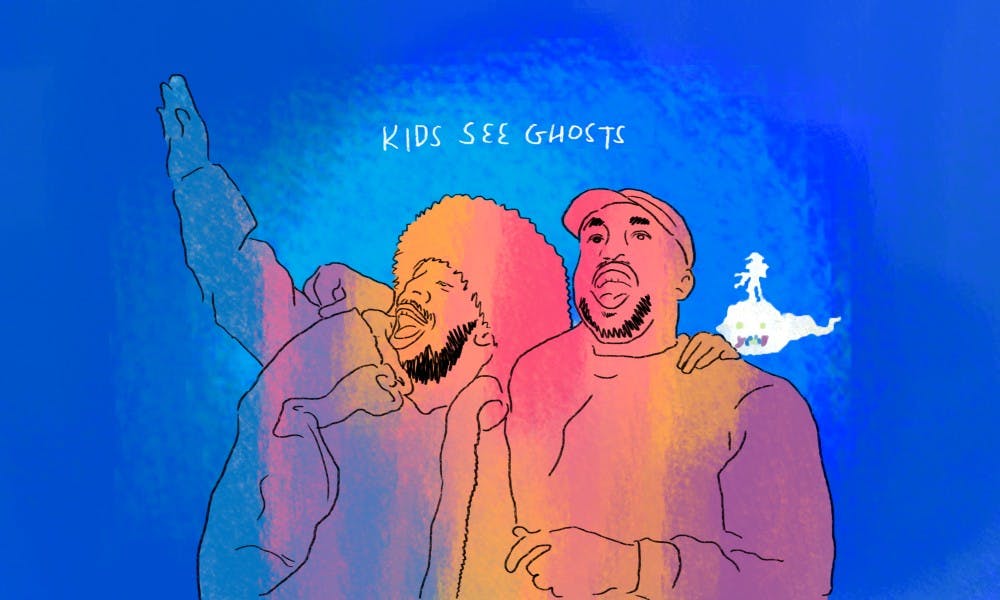
"Reborn" stands out as a work by Kids See Ghosts, a duo of my two favorite artists, Kanye West and Kid Cudi. Among the seven tracks from their self–titled album released in June 2018, the song stuck out among the others as the most emotionally jarring, introspective piece, hitting close to home.
Let’s start with the production—the track isn’t grandiose in its instrumentals, but “Reborn” conveys a beautiful, tranquil vibe. From Cudi’s opening humming over the soft piano chords to the dulled drum–clap beat, the song feels otherworldly, transporting you to a dimension of solace that siphons away all the negative emotions clouding your thoughts. As someone who constantly struggles with being swallowed up by such feelings on a daily basis, I find it to be a purifying experience for the production alone.
Regarding the content itself, “Reborn” covers West and Cudi as they analyze their personal problems and struggles with mental illness before resolving to push past their mistakes and obstacles. West’s verse deals with his controversial nature and battles with social anxiety and bipolar disorder, noting that “Soon as I walk in, I’m like, let’s be out” and “I was off the meds, I was called insane,” before responding that “I want all the rain, I want all the pain” and “All of you Mario, it’s all a game.” West constantly faces environments where he feels out of place or disparaged by others, but he resolves to deal headfirst with those obstacles, because life is like a game which you have to play until the end, just like Super Mario.
Similarly, Cudi discusses his drug addiction and depression, as he raps “At times, wonder my purpose / Easy then to feel worthless / But peace is something that starts with me.” Like West, Cudi has had his fair share of issues, but is expressing a firm determination to overcome them. The chorus is simplistic; a repetition of “I’m so—I’m so reborn, I’m movin’ forward / Keep movin’ forward, keep movin’ forward” with slight variation, which echoes the same notions expressed in the rappers’ respective verses.
In regards to personal meaning: like many other Penn students, I’ve struggled with depression and feelings of being worthless. I’m prescribed Lexapro, the same SSRI that West has taken in the past. Both artists have explored the depths of misery in their music, whether it be in 808s and Heartbreak by West or in Man on the Moon I or II by Cudi, so to hear them declare that they won't be stopped by personal nadirs is inspirational, giving hope that life can, and will, get better as long as you don’t give up. Like a phoenix, we can all be “reborn” from the ashes of our past.
“Well-dressed” by Hop Along
Sam Kesler
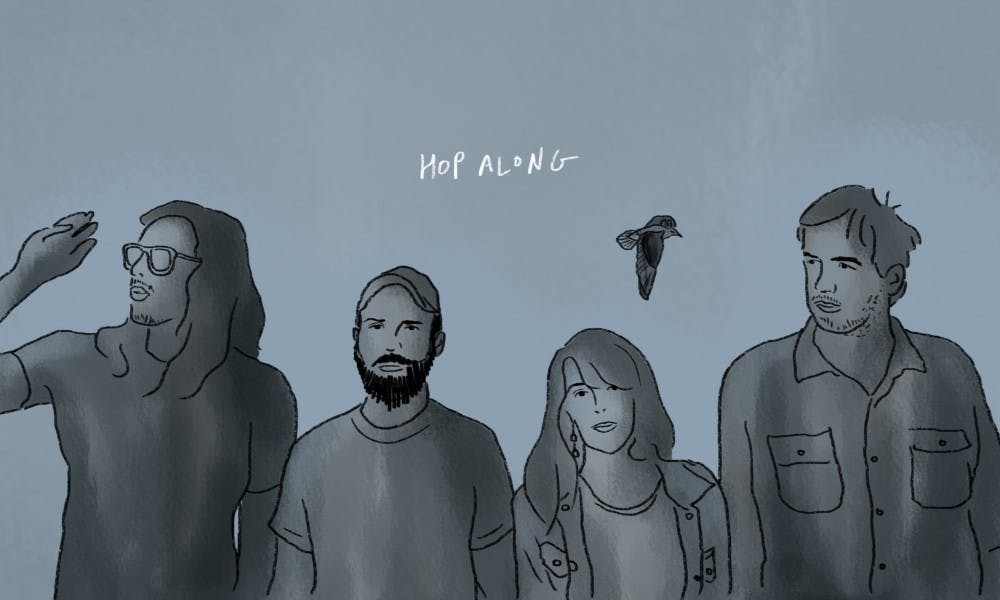
I am notoriously indecisive. Everything from ordering at a restaurant to what I’m going to wear each day; I can take hours to pick a movie on Netflix. So when it came time to pick a college, I was screwed.
I took a couple weeks off in high school to visit the three colleges I had been accepted to, and see what I thought of each of them. I made my first stop in Philly, where I spent my Quaker Days running up the Rocky Steps in the rain, trying Wawa milk for the first time, and seeing the Philly skyline from the Rodin rooftop. I had a good time, but I was soon off next to New York for another college visit.
When I got there, however, I learned that the school I was visiting wouldn’t give me any financial aid because I missed the application deadline. So that was out of the question, and now I had some time to kill in NYC. I spent it walking around, listening to music, hoping to hear something new. And Hop Along’s “Well–dressed” came on.
Beginning with just Frances Quinlan’s hushed voice singing, “Well–dressed, but walking in the wrong direction,” over an acoustic guitar, she goes on to describe her central narrative figure, misguided and confused, who over the course of the song descends into paranoia and fades away. The entire band jumps in halfway through to accompany, turning the gentle song into an anthemic and frightening portrayal of mental illness, as Quinlan sings, “doo doodoo doodoo” until the bands exits once again, and her scream turns back into a whisper.
I googled the band and found out they were from Philly, and by the time I arrived at my third college, there was no need to make a decision: I already knew I’d be attending Penn. I had to move to Philly.
That summer, I listened to their album Painted Shut on repeat, screaming along to their songs while driving my mom’s 1999 Honda Odyssey until my voice felt as raw as Quinlan’s, trying my best to imitate that impossible raspiness. “Well–dressed” was always my favorite, crafting a compelling story that leaves so much hidden, and using the music to wrap each word in gravitas. It builds beautifully in a release of emotion, then turns away like a camera being put back into its case.
When I finally got to see Hop Along in concert last year, they performed “Well–dressed” for the encore. I stood at the front of the crowd and recited every word back, not caring that my voice would be shot the next day. It felt like the culmination of a long journey to be there, to see the people who had inspired my college life, and to hear the song that showed me where I needed to be. By the time it finished, I felt like Rocky, throwing his arms up and looking out at the city.
I knew I wanted to be in a place where music like this could exist, where a band who eschews genre and convention could be one of their most revered and celebrated. If it hadn’t been for that song, I might never have chosen Penn, or gotten started writing about music, or met so many of the wonderful people who support and inspire me. I might not have made any of the other great decisions I’ve made ever since I heard it.
Hop Along shaped the sound of my summer after high school as I dreamed of Philly, and continues to shape my life in college. I've heard it many times since, but “Well–dressed” will never be heard right unless it’s from the speakers of my mom’s minivan, on full volume as I avoid potholes driving home.
“I Wanna Get Better” by Bleachers
Beatrice Forman
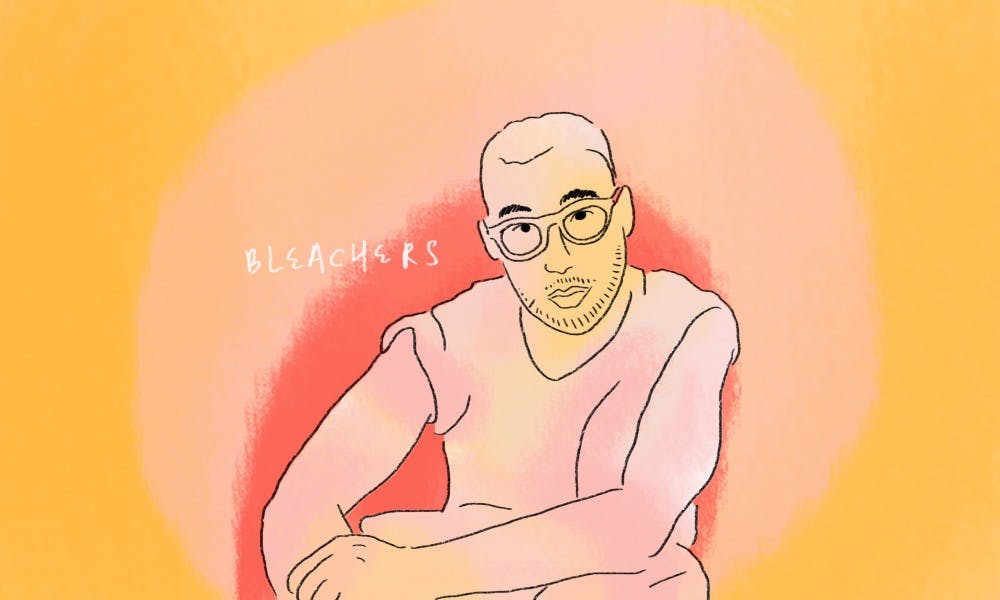
They say you often remember the exact moment you fall in love, romanticizing a memory so hard it becomes ingrained in the left side of your brain. I remember the first time I heard Bleachers, a four piece indie band headed by megawatt producer Jack Antonoff, and while I’m not sure if this means I’m in love, I definitely feel something close enough to it.
It was the spring of eighth grade and I was desperate to change everything about myself before high school. I went through a check-list endemic to the experience of a pudgy middle school girl with a quiet, if existent, social life: Lose weight, check. Learn how to do eyeliner, check. Make friends and maybe kiss a boy, a work in a progress. In short, I wanted to get better, however elusive that process may be. So when this song played during my morning workout, which was riddled with sit–ups and Eighth Grade–esque affirmations, it felt like the universe was trying to tell me something.
“I Wanna Get Better” was a jam baked in the sadness of evolution, of realizing that growth never stops and only slows. The song sounds like a plethora of beginnings—the piano mimics a doorbell ringing, the drum pantomimes incessant foot-tapping, and the synths crescendo. Actually comprised of some voicemails and choppy piano keys, the song details Antonoff’s grief process following the premature death of his sister and cousin. It's a therapy session condensed into three minutes and twenty six seconds, culminating in an ultimately inspirational message—Antonoff wants to get better, even if it means shedding the traumas that make us.
When superimposed on the experience of a middle school girl lacking teenage friendships with substance and the maturity to differentiate loneliness from simply being alone, “I Wanna Get Better” sounded like an anthem. The lyrics’ unabashed honesty resonated deep within me, shaking the relentless part of my personality that white—knuckles acceptance like its fleeting. Lines like “I’ve trained myself to give up on the past” and “I miss the days of a life still permanent,” while now clearly about grief, echoed my personal mission. I yearned to forget my old self, who still wanted to hang out with the cliques that shunned her and fantasized about bat mitzvah invites, in a favor of a new self. A better one, insulated by a girl gang and an ebullient self confidence.
While admittedly “I Wanna Get Better” didn’t make me better in the ways I hoped—I mastered eyeliner but never small talk or flirtation, and never accumulated more than a handful of convenient friendships—it did, in some roundabout manner, make me better in a more important way. The song spawned what rapidly become an obsession with Bleachers that lead me to do something my middle school self would balk at: Go to a concert alone. Twice.
The second and third times I saw the band headline, at Governor's Ball and Terminal 5 respectively, I weathered the awkward silences between acts with a measured amount of gusto and talked myself out of buying unnecessary merchandise. I rode the wave of a concert’s climax alone and screamed the lyrics that defined my teenage years with tone deaf earnest and confidence. For the first time, my solitude was unfettered by solipsism. My loneliness felt crowded, teeming with the exuberance of a live performance. Had I had company, I wouldn’t have been present. I would’ve floated above myself, somewhere in the mezzanine of a concert venue, worrying if my friend was dancing enough or texting other people about the other places she’d rather be. “I Wanna Get Better” made me redefine better in kinder terms. Better is quieter, and more self–assured. Better takes stake in what a moment has, not what it lacks.
“I Wanna Get Better” taught me that loneliness and being alone aren’t synonyms, and that ultimately the only person I should want to get better for is myself.
“No Waves” by FIDLAR
Johnny Vitale
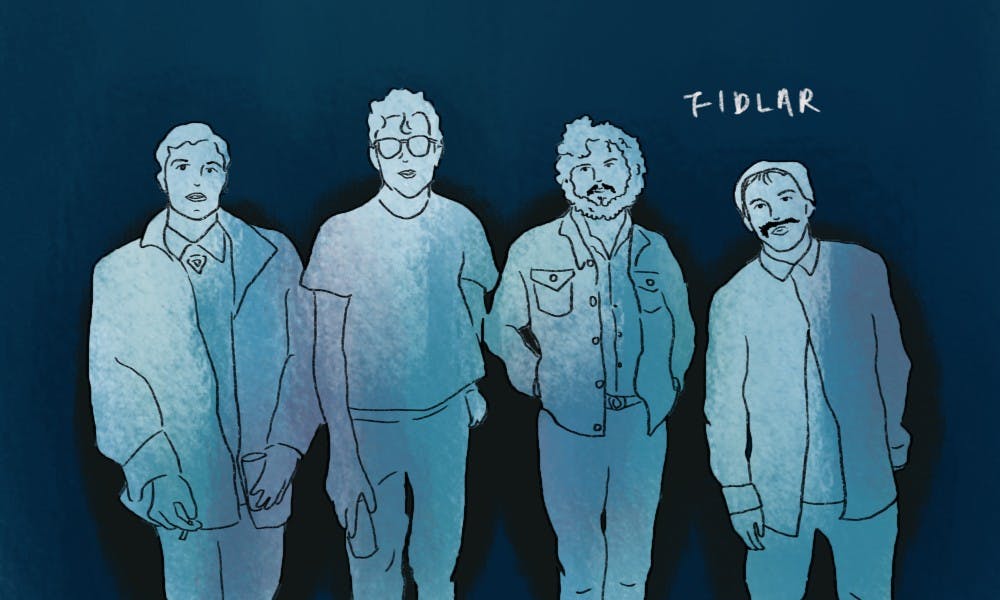
Suburbia is boring as all shit, especially on the outskirts of Los Angeles. Driving down the arid, eight–lane freeways, homogenous housing complexes spring up from the desert as far as the eye can see. This sameness comforts some, but for the pseudo–existentially concerned teenagers, it becomes unsettling. Strip mall after strip mall, any night’s good enough to get high and go to McDonald's. There has to be more than all this concrete and dirt, we thought to ourselves. And who the fuck decided it would be a good idea to put these palm trees here?
At 16, I heard FIDLAR’s “No Waves” for the first time. “I feel, I feel like fucking up my life / Again with all my friends / I hope we’ll make it til the end,” I screamed with the wind in my face driving top down through the summer heat. Sweating bullets, my friends and I journeyed home from the beach that day, an hour long ride, shirts off and sunglasses on, hoping that someone would look at us the wrong way.
The song birthed my infatuation with the emerging SoCal garage rock; as with every disenchanted high–schooler, I’d be obsessing over Burger Records for years to come. Up until hearing FIDLAR, I thought rock and roll had died and all that was left were my Led Zeppelin records. What a relief it was to happen upon a thriving garage rock scene.
Listening to FIDLAR felt important in such a way that only youthful naivete can allow for. Contrarian in its raw authenticity and provocative with its drug–induced escapist theme, “No Waves” frantically amplified our underlying apathy louder than we would've been able to scream it ourselves.
For us, boredom was a byproduct of always searching for something more. In retrospect, I don’t think we knew what we were looking for. I don’t know if I even could say now what it was. Freedom? Control? Identity? Maybe all of those at once. Beautifully uncertain as we zig–zagged through our teenage years, we painted walls and picked fights, but nothing could prepare us for what was to come. The bubble burst, we grew up, and we moved on. Time is a double edged sword to say the least.
Now we’re settled in our identities apart, seemingly confident in who we are and what we do. Yet when we reunite, I get a sense that we’re still looking for that something. Sometimes I question whether this search must go on. Or will we settle ourselves? Will it be cool? I’m not sure.
But I still get bored, and I still listen to “No Waves.”
“Nobody” by Mitski
Julia Davies
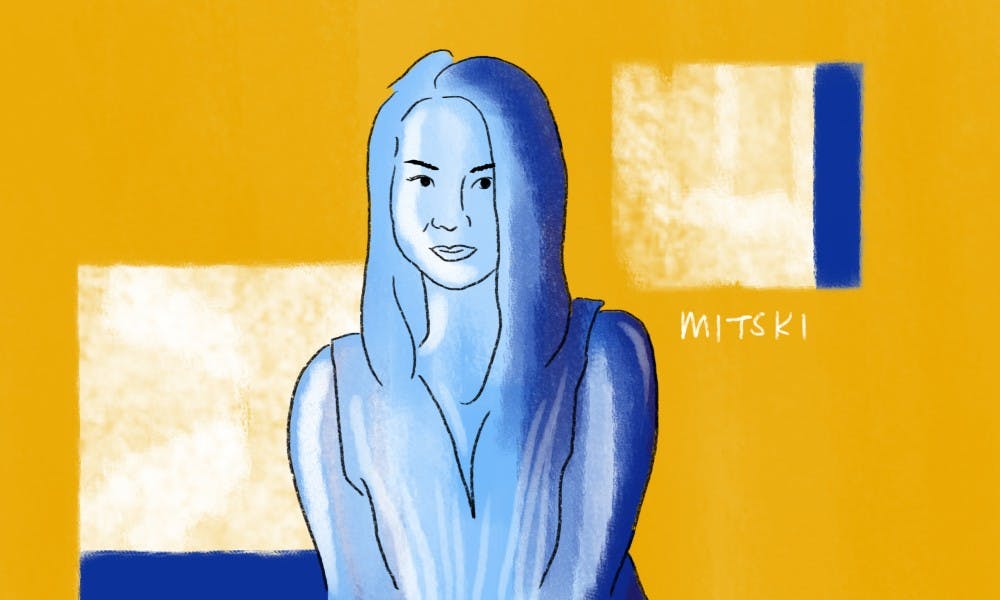
Throughout my first semester of freshman year, I found myself returning to one album: Mitski’s Be the Cowboy. To me, Mitski’s lyrics were the most honest words I had heard. Her album was a source of comfort, a soundtrack to my days spent getting lost on campus, trying to make friends, and forgetting where I had placed my PennCard. Be the Cowboy is an album about being vulnerable, independent, and anxious, and I don’t think that I could have discovered it at a better time. Although it’s been only a semester since my nonstop listening of the album, I sense that it will become one of those albums that I listen back on and be flooded with the memories and emotions tied to it.
I could have chosen the dozen of other songs on her album as emblematic to my experience, from the angsty energy of “Geyser” to the quiet longing of “Two Slow Dancers.” I think what makes “Nobody” so special to me is the irony of it. Mitski takes a disco beat and for a moment you feel like that this deep and dark musician has given us a reprieve, a dance track, but then she layers lyrics about alienation and loneliness on top. In a way I found it representative of my first few month of college. Newfound freedom and fun, paired with anxieties and feelings of loneliness.
Mitski begins with the lines “My God, I’m so lonely / So I open the window / To hear sounds of people.” It’s words that I think everyone has experienced: when you're surrounded by people yet still feel a sense of loneliness. You feel that something is missing. I’ve begun to realize that, with the independence of young adulthood, I’ll always be missing someone. At school, I miss my parents and my high school friends, and back at home I miss my college friends and classmates. Having two homes means I’ll always be feeling some sort of homesickness. I think that in a sense I’ll always feel a bit lonely or lacking wherever I go, but I’ve come to accept this feeling.
In the second verse, Mitski sings, “I’ve been big and small/ And big and small/ And big and small again/ And still nobody wants me.” These words are not a call for pity, but rather a declaration of self–empowerment. At the end of the day, the only person who will be there to handle all of our highs and lows are ourselves.
I remind myself that I have to recognize my small successes. At the end of the day no one will congratulate me for making it to all my classes on time and remembering to brush my teeth. But, it’s okay to celebrate myself for getting both the big and little things done. Independence is hard, so be easy on yourself.
"Love Strong" by Moon Boots
Paul Litwin
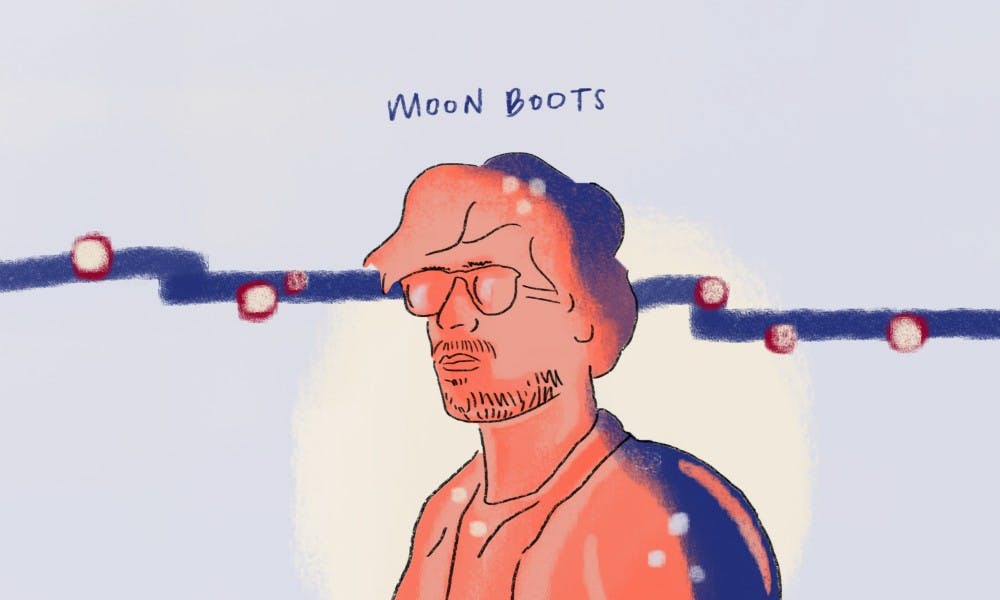
“Love Strong,” by Brooklyn DJ Moon Boots, is forever, in my youthful mind, a song of escapism and optimism. Boston, especially during the long winters, is not always a hospitable and warm place in which to grow up. Between November and March, you’re thrilled if the temperatures hit over 50 degrees, and more often than not, it’d be dark outside when you left for school and dark outside when you got out.
Additionally, throughout my junior year I was often in school from 8 a.m. until 7 p.m. or so, participating in extracurricular activities, clubs, and doing homework. All these factors make for a pretty mundane and displeasing high school experience, and when coupled with significant medical and personal issues, by my sophomore year in high school I was pretty ready to get away.
That’s where “Love Strong” came in. I don’t think it has profound lyrics, or meaningful connotations, but “Love Strong” was my first introduction to nu–disco, a breezy and uplifting genre that musically took me to a place very far from home. “Love Strong” was my introduction to Moon Boots, a talented producer with a knack for creating beautiful, carefree music crafted with moving vocals and pleasant, if standard, lyrics.
But to me, “Love Strong” was more than care–free disco. It was warmth, it was sun, it was nightlife, and it was something more than my daily routine of eat–commute–learn–commute–study–eat–sleep. Britt Julious of Pitchfork described the song’s hook as “late–night dance floor battle cry," but to me the song was as much about a daytime atmosphere as it was about nighttime energy. Moon Boots has a unique gift for producing shining soundscapes full of soul and energy, and “Love Strong” is the epitome of the rhythm he is capable of creating.
The bubbly production and upbeat bass track didn’t just feel like a juxtaposition to my daily routine, it felt like a promise that there was something else out there. Not everyone grows up in miserable winter hellscapes, and not everyone is discontented with their high school experience.
Rather than making me jealous, “Love Strong” was a reminder that tough times are temporary. Throughout much of my time in high school, I struggled with health concerns, and while it was nothing life–threatening, it was incredibly overwhelming and dismaying. Music was my biggest escape, a reminder that there are other lives to live and that positivity does nothing but help. I can now confidently say that Moon Boots is one of my five favorite artists of all time. His ability to identify a melody and complement vocals with it has been, in my opinion, unparalleled among other recent nu–disco artists.
In contrast to my memories of listening to Chance the Rapper’s Acid Rap or Calvin Harris’ “Sweet Nothing” during warm summers with friends, “Love Strong” truly felt like my escape and my memory. While I still have personal attachments to those other pieces of music, my attachment to "Love Strong" was, and is, entirely individualistic. I’d like to think that since those high school days, the optimism of there being a better life out there has been fulfilled to some extent. I will always have fond memories of “Love Strong,” both as a great musical track, and as an escapist song with promises of optimism going forward. I’ve made some amazing memories since coming to Penn, and I’ve had some incredible life experiences, which myself from five years ago certainly would not have foreseen.
"The Lion The Beast The Beat" by Grace Potter and the Nocturnals
Annabelle Williams
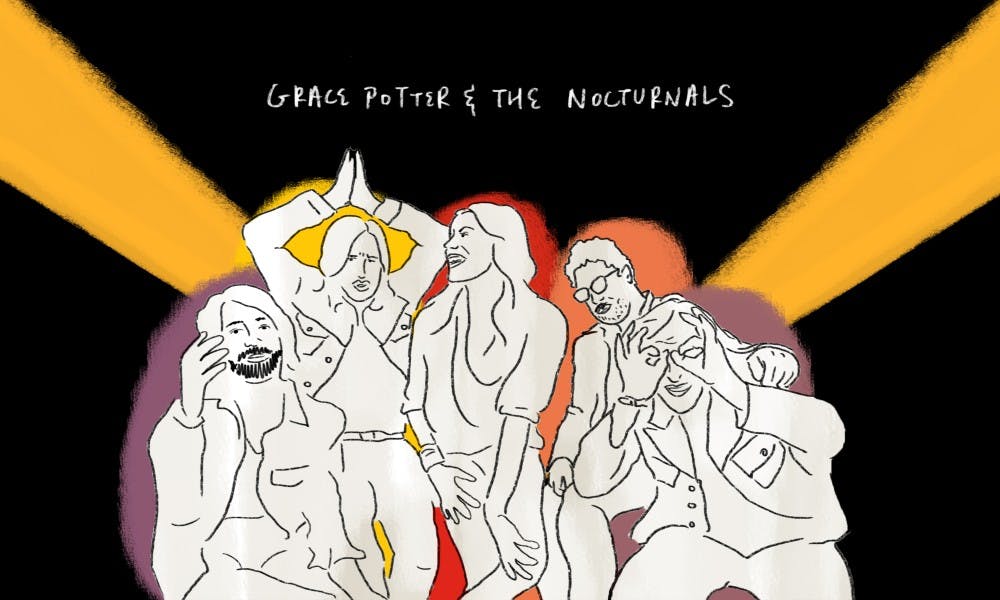
Grace Potter and the Nocturnals are not a prolific band. They're not one of my favorite bands. They're not a band I listen to often. Their last album on Spotify was released in 2012, and I haven’t listened to it much since 2014 or so. But in 2012, on my father’s recommendation, their song “The Lion The Beast The Beat” made its way onto my running playlist. I’d take my iPhone 5, slip it into the waistband of my spandex or the armband with its clear case, thread the headphones around my ponytail, and play the song.
The tempo stayed constant and I’d sync my steps to the beat on the grassy, uneven path. It also helped with the breathing—a clear, uncomplicated in–and–out. Since I began running in fourth grade, I ran nearly every day until ninth grade. I wasn’t amazing, but I was dedicated. I ran until it hurt and then ran some more. I ran well enough to be on varsity cross country my freshman year. I ran so much and so intensely that it became fundamental to my identity, as ingrained in my routine as swiping on deodorant in the morning. I could recite my mile time, my 5K, my 800, faster than I could tell you my siblings’ ages. I still can.
And this song, for some reason, sticks in my head, winds itself with my running. I listened to other stuff— Counting Crows, a regrettable Nickelback phase, Panic! at the Disco—but when I think of running, I think of this one bend at the Downingtown East cross country course, heading downhill, looking at the ground to check for roots, while “The Lion The Beast The Beat” blared.
Freshman year of high school, I got injured. It was so bad I could barely walk for a bit, and after physical therapists and specialists and surgeries and cortisone shots, I tried to go back. But I couldn’t. It hurt too much. I don’t run anymore. I can do short distances, but the aches in my foot and the off–kilter curve of my back don’t allow for anything like what I used to have. I see joggers on the street and try to hide the burn in the back of my throat.
I haven’t been able to listen to “The Lion The Beast The Beat” much since I got hurt. It came up on shuffle and I skipped it. But the first time I listened in full since that one good day on the course was in April of 2019, getting ready to write this. The funny thing is, the song isn’t even that good. It’s a little overdone, and drags on for too long, roughly the same amount of time it once took me to run a mile. Grace Potter’s voice is good, adaptive, and goes from crooning to screaming. But when I listened, all I wanted to do was turn it off. And maybe run away.
"Hide and Seek" by Imogen Heap
Dalton DeStefano
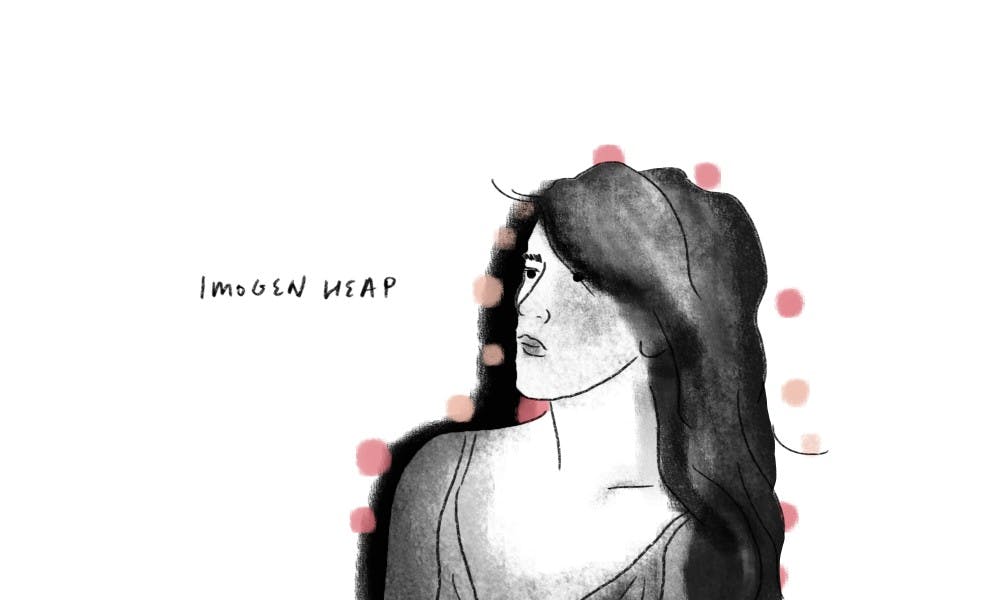
You’ve heard parts of this song before, even if you don’t realize it. Imogen Heap isn’t a household name, but this song has become ubiquitous—almost by accident—since coming out in 2005. It’s sampled on the chorus of the song “Whatcha Say” by Jason Derulo. It was featured in a pivotal scene of the season two finale of The O.C., which was then turned into an SNL skit that has since become a meme.
The original song, though, is something much more mysterious. No instrumental, no piano or guitar providing a reassuring outside tempo. Just one voice—fed through a vocoder—and nothing else.
I discovered it in my freshman year of high school. I probably heard about it online somewhere and searched for it on Spotify. I remember hearing it for the first time in the back seat of my mom’s car as we waited in the school parking lot for my sister. I played it over and over and over—my sister was often late, so I had time to kill. I think it was grey and cloudy outside, or maybe the song just made it feel that way.
I had never heard anything like it before. The song doesn’t come with a road map. There’s no beat drop or triumphant final chorus, no three–act structure or characters to identify with. It’s more like a poem: “Oily marks appear on walls,” “crop circles in the carpet.” It sounds like a barren living room, with dust particles swirling around and glistening as they come in contact with rays of sunlight shining through the windows.
Heap’s distorted intonation is jarring, and the strange imagery seems nonsensical, but maybe that makes it all the more human. After falling down the rabbit hole of song lyric analyses, I’ve heard theories that peg the song as a story of divorce from the perspective of a child, other ones that think it’s a reaction to the fear and uncertainty that struck the world post–9/11. Heap herself has never explained much beyond the fact that the song is about “losing someone.”
That melancholy is certainly there. It washes over you like high tide, at once calming and unnerving. A disembodied, alien voice swells over ethereal synths: “Where are we? What the hell? Is going on?”
I’d be lying if I said I listen to this song every single day. Upbeat dance–pop is my bread and butter, and people who know me will be surprised that I picked this song instead of a glam–pop track from Gaga or a techno Ke$ha throwback. “Hide and Seek” isn’t on any of my Spotify playlists. It’s not something I queue up as I’m walking to class or working in the Street office. But I put it on every once in while, and one listen always turns into an hour on repeat. It’s stuck with me like few songs have.
Imogen Heap captured something that I can’t quite place—maybe she wouldn’t even be able to explain it herself. It’s sadness, but there’s an odd comfort, too. There’s pain and confusion and bitterness, but there’s universality to it—like she’s capturing humanity at its rawest, all within the frequency of a robotic voice.
I still haven’t quite figured out what she’s trying to say. But I can feel what she’s feeling. I felt it that afternoon in my mom’s car and I feel it right now, as it's playing in my apartment. I think that’s what she intended.
“Same Drugs” by Chance the Rapper
Teresa Xie
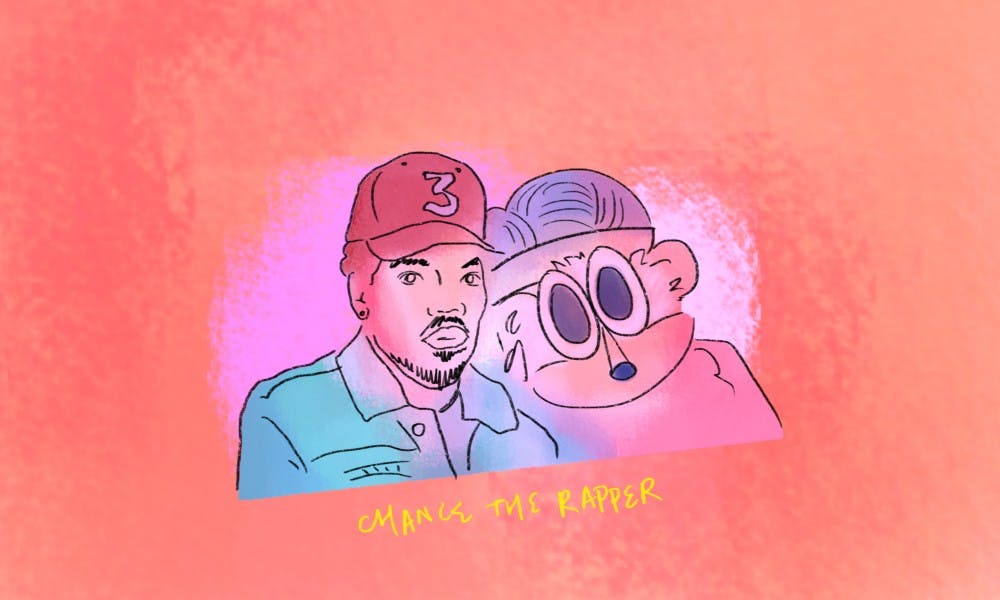
Growing up on the South Side of Chicago, Chance the Rapper’s presence has always flooded my memories. Chance is like a day well spent sunbathing by the lake. He is a bonfire with my closest friends. He is a carefree trip speeding down Lake Shore Drive. Chance the Rapper was an artist we all rallied behind, because even as he was making it big, he would always remember to come back to Chicago, his home where it all began.
“Same Drugs” came out at end of my sophomore year in high school, with the release of Chance’s album, Coloring Book. During that time, I was in the midst of a strange period in my life, unsure of who I was or what to label this point in my teenage experience. Even if it was just for a moment, the vibrant energy of Coloring Book was contagious. Track after track, the promise of a sunny future seemed closer and closer. But for “Same Drugs,” the peculiarity of this song was rooted in the way it alluded to an inevitable sadness that I couldn’t quite put a finger on at the time. Now, I know it is a bittersweet sentiment to growing apart, to growing up, and to the reluctance that comes with it.
The importance of “Same Drugs” lies in the way it evolves over time. I’ve heard Chance perform the song live twice. The first was at Magnificent Coloring day, at the beginning of my junior year, and once at Lollapalooza, right before my senior year. That first time, I went with a group of friends, in awe of the fact that U.S. Cellular Field looked like a celebration of colors, of the city, and of music.
When Chance started playing the first few notes of “Same Drugs,” it elongated the naivety of the moment, making it feel as if it could slip away at any time. By the time I found myself alone in the middle of a massive crowd at Lollapalooza a year later, the lyrics “We don't do the same drugs no more,” symbolized something completely different. I was no longer standing in awe, but rather coping with letting go of a person that used to be important to me. Between those two performances, I had evolved, and the song had evolved with me. It would evolve again, as I waved goodbye to the first of my friends leaving for college, and again, when I stepped into my old bedroom for the first time in three months over Thanksgiving break, the calendar hovering over my desk still turned to August.
“Same Drugs” is an anthem to the acceptance that things will never be the same. For me, this realization manifested itself in different ways: Through the loss of a friend, the shift in dynamics of relationships, the end of high school, the beginning of college. It serves as a reminder of the way life constantly moves, whether we’re ready for it or not, often leaving us to wonder about time exactly as the lyrics do: "Where did you go?"
